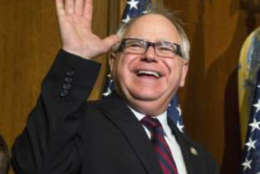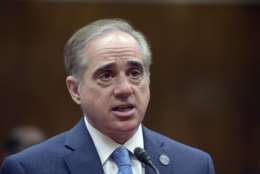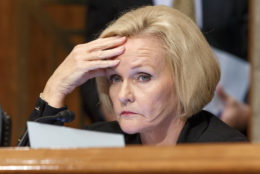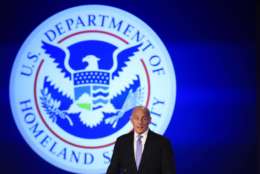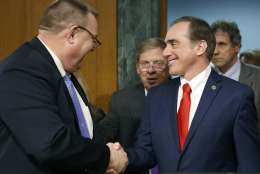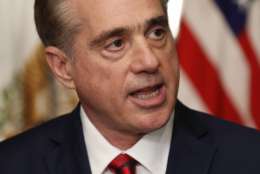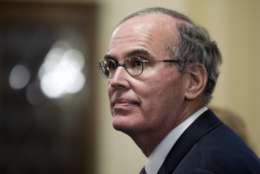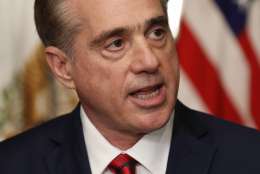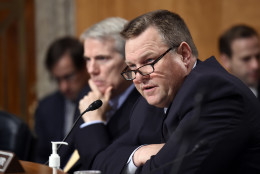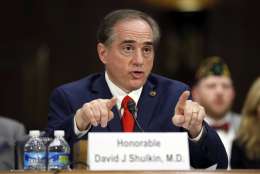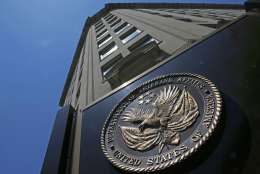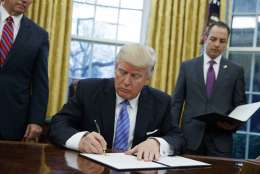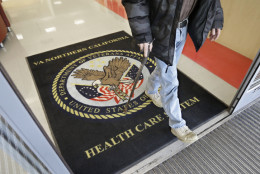Jon Tester
-
The House will pass the VA Accountability First and Whistleblower Protection Act, clearing the way for the President to sign the bill later this week. Some lawmakers and veterans service organizations see the bill's passage as a major win after years of debate over new accountability legislation. But federal employee groups say the bill would do more harm than good.
June 13, 2017 -
Veterans Affairs Secretary David Shulkin offered the first glimpse of his plan to redesign the current Veterans Choice Program. He's calling it the Veterans' Coordinated Access Rewarding Experience (CARE) Program, and under the new initiative, veterans would no longer access community providers based on a set of arbitrary, administrative rules.
June 08, 2017 -
The president's 2018 budget proposal includes cuts to the Transportation Security Administration and grant programs for local law enforcement. But some senators say the funding increases at other parts of the Homeland Security Department come at the expense of valuable tools to respond to threats at United States ports of entry and smaller scale and local incidents.
June 06, 2017 -
President Donald Trump's fiscal 2018 budget request suggests personnel cuts at the majority of the 24 largest federal agencies. But the Homeland Security Department is one of the few that could undergo a bit of a hiring spree next year.
May 25, 2017 -
Both the Veterans Affairs and Justice departments believe they can easily resolve some concerns with the constitutionality of the VA Accountability and Whistleblower Protection. DoJ is concerned, however, that VA will run into the same issues that ultimately rendered a controversial provision on firing senior executives unconstitutional.
May 18, 2017 -
Members of the Senate have reached a long awaited agreement on new accountability procedures for senior executives and employees within the Veterans Affairs Department. A bipartisan group of senators introduced the Veterans Affairs Accountability and Whistleblower Protection Act Thursday morning. It would change current disciplinary appeals rights for both SES and rank-and-file employees.
May 11, 2017 -
Employees who handle veterans benefits claims and the disability claims backlog, as well as some cybersecurity professionals, are among the Veterans Affairs Department's additional hiring freeze exemptions. VA Secretary David Shulkin announced more exemptions in a March 13 memo to staff.
March 20, 2017 -
Since Michael Missal took over as inspector general at the Veterans Affairs Department about a year ago, his office has turned up some improvements, some deteriorations and the odd surprise.
March 10, 2017 -
An extension and then redesign of the Veterans Choice Program, along with new employee accountability legislation, are top priorities for new Veterans Affairs Secretary David Shulkin. He said he's working with Congress on new legislation to support those initiatives.
February 28, 2017 -
Sens. Claire McCaskill (D-Mo.), ranking member of the Homeland Security and Governmental Affairs Committee, and John Tester (D-Mont.) wrote to Comptroller General Gene Dodaro on Feb. 6 asking for an analysis of what went right and what went wrong when DoD moved to the Office of Personnel Management’s Federal Investigative Service (FIS) nearly 12 years ago.
February 07, 2017 -
David Shulkin, President Donald Trump's pick to lead the Veterans Affairs Department, earned high praise from the Senate committee during his nomination hearing. Changing the department's current Veterans Choice Program and crafting new accountability and disciplinary procedures for VA employees were common topics.
February 02, 2017 -
Rob Snyder, the acting secretary of the Veterans Affairs Department, officially exempts some health care, construction and project management professionals from the President's short-term hiring freeze. Snyder's announcement comes after repeated appeals from some lawmakers, who said the freeze could impact veterans' ability to access health care.
January 27, 2017 -
The Office of Management and Budget detailed a few immediate actions that agencies should take following President Donald Trump's recently announced hiring freeze.
January 25, 2017 -
The Senate Veterans Affairs Committee took on the recommendations from the VA Commission on Care's recent report on veterans health care.
September 15, 2016 -
The four companies awarded contracts for background investigation work are made up of two new faces and two current federal contractors.
September 12, 2016

